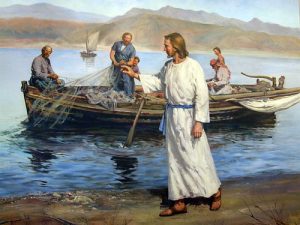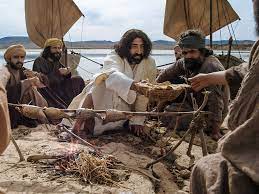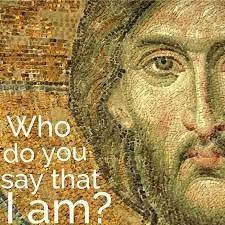Jesus invited: Come after me.
At once they left their nets and followed him.
 Our call to holiness is not a one-time beckoning. Everything was not hunky-dory when Peter, Andrew, James and John rolled up their nets and walked away with Jesus. The call back to the simple, predictable life of a fisherman may at times have been strong enough to give them second thoughts about this little-known upstart from Nazareth. The barbs of criticism aimed at them and their hero and their suffering as the butt of jeers must have stung deeply. But they were, for the most part, steadfast in their loyalty to the Master. They could have spent time wringing their hands bemoaning the awful conditions of their known world. Instead, they looked to Jesus for direction and followed his unwavering example of feeding the hungry, caring for the sick, comforting the sorrowful.
Our call to holiness is not a one-time beckoning. Everything was not hunky-dory when Peter, Andrew, James and John rolled up their nets and walked away with Jesus. The call back to the simple, predictable life of a fisherman may at times have been strong enough to give them second thoughts about this little-known upstart from Nazareth. The barbs of criticism aimed at them and their hero and their suffering as the butt of jeers must have stung deeply. But they were, for the most part, steadfast in their loyalty to the Master. They could have spent time wringing their hands bemoaning the awful conditions of their known world. Instead, they looked to Jesus for direction and followed his unwavering example of feeding the hungry, caring for the sick, comforting the sorrowful.
Even in the darkest hours they clung to hope. Hope is a spark that can become a flame. The same puff of breath that can snuff out the spark, more gently exhaled can coax the spark to burst into a lively flame. The same vocabulary we use to engender hope, spoken in a derisive tone, may dash all hope to the ground.
In these days of our Sisters’ strategic planning I invite you to figuratively hold hands in fervent prayer that we will be courageous, hope-filled, sensitive, patient, considerate – truly “sisters” to one another as we grapple with the tough issues that lie in our laps.
We are made for this time. Benedictines are committed to being life-long learners. For all our preceding years we have been training, practicing, getting ready for this exact moment in our history. As Hel Basse writes in Give Us This Day for January 23, 2026: “If you want to go fast, go alone. If you want to go far, travel together.”
A few years ago, Pope Francis said in one of this Sunday addresses: ”Go forth and don’t be discouraged. Don’t be fools, remember, a Christian doesn’t have the luxury of being foolish. An idiot, a fool – you can’t give yourself that luxury. You have to be clever, be astute!”
Let us reach out. Let us catch the light from each other’s flickering flames, coax them brighter and bring them closer together to shed a united light on possibilities that will lead us into the future God already has in mind for us.
Pray this week that you may discern what nets are holding you back from following Jesus’ daily quiet calls.
~Reflection by Sister Roberta Bailey, OSB
This is also Oblate Sunday at the Monastery – they will gather at the monastery or via ZOOM for Mass and dinner with the Sisters. This Sunday they will spend time with S. Tonette for a presentation on the obligations of Oblates. As time permits, S. Mary David will lead a teaching session including discussion of the “homework” assignments.
Basically, a Benedictine oblate is a layperson or secular priest who associates themselves with a specific Benedictine monastery, committing to live according to the
Rule of Saint Benedict in their daily life. While not taking formal vows or living in the monastery, they become part of an extended monastic family, integrating prayer, work, and spiritual values into their personal lives in the world.
Key Aspects of a Benedictine Oblate:
- Spiritual Affiliation: Oblates affiliate with a particular monastery, participating in its spiritual life while maintaining their own vocations, whether single, married, or working.
- The Rule of Saint Benedict: They adapt the principles of the Rule—such as moderation, community, and prayer—to their secular life.
- Oblation as Self-Offering: The term means a “gift of themselves” to God in union with the monastery.
- Promises: Oblates make promises that often include stability (a commitment to their monastery), fidelity to the spirit of the Rule, and obedience to God’s will.
- Prayer Life: They often engage in the Liturgy of the Hours and Lectio Divina (sacred reading)






